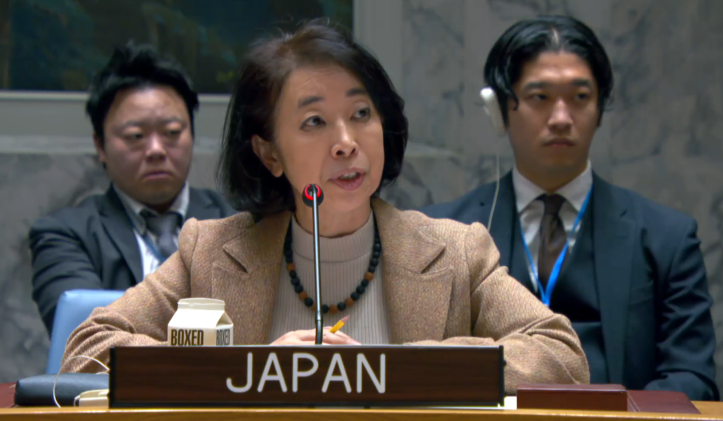テロに関する安保理ブリーフィングにおける志野大使ステートメント
令和6年2月15日

(As delivered)
Thank you, Madam President.
I thank USG Voronkov, Executive Director of the Counter-Terrorism Committee Executive Directorate Natalia Gherman, and INTERPOL Secretary-General Jürgen Stock for their briefings. I also thank the Analytical Support and Sanctions Monitoring Team for its work on the report.
Despite continued efforts by Member States and UN entities, ISIL remains a serious threat to international peace and security.
Terrorism causes greater instability in already vulnerable regions. Terrorists exploit fragile and unstable local security situations for their own purposes.
Japan is deeply alarmed by the deteriorating and complex situations in conflict zones, including but not limited to the situation in West Africa and the Sahel.
Madam President,
With regards to combatting terrorism, let me highlight the following three points.
First, we must address the root causes of terrorism and violent extremism with a long-term and comprehensive approach. A security-centred approach alone is insufficient to counter this threat.
Japan resonates the Secretary-General’s view expressed in his report regarding the necessity of comprehensive, multi-tiered and multi-stakeholder responses that put the primary focus on preventing violent extremism conducive to terrorism. In this connection, we emphasize the importance of a holistic approach through the lens of the human security, by promoting the Humanitarian-Development-Peace (HDP) Nexus.
Japan is committed to support capacity-building efforts in cooperation with Member States and UN entities in this regard.
The importance of a whole-of-society approach cannot be overstated. Such an approach allows us to address multi-faceted challenges from diverse perspectives, ensuring that all stakeholders, including civil society, are engaged in a cohesive and coordinated response.
In this vein, we encourage Member States to incorporate the analysis and recommendations of the Counter-Terrorism Committee Executive Directorate assessments in their prevention strategies.
Secondly, we need to address the challenges of people in vulnerable situations, especially women and youth, whose dignity and human rights must be respected. We are deeply concerned that women and girls are affected by sexual and gender-based violence committed by ISIL.
In this vein, particular emphasis should be put on integrating a gender perspective.
Neglecting gender considerations not only undermines the effectiveness of counter-terrorism measures but also risks worsening conditions that may foster terrorism and violent extremism.
Therefore, it is crucial to integrate Women, Peace, and Security (WPS) considerations into counter-terrorism efforts. This approach not only addresses the immediate impacts of terrorism on women and girls, but also empowers women and girls as pivotal players in conflict prevention and peacebuilding, thereby fostering a more sustainable and lasting peace.
Finally, Japan supports more effective usage of the 1267/1989/2253 sanctions regime, aiming to disrupt financial networks that sustain terrorist operations. It is imperative to cut off the means of financing of terrorism.
UN sanctions are an important tool under the Charter of the United Nations in the maintenance and restoration of international peace and security. Japan calls on Member States to fully and robustly implement sanctions measures to counter and prevent the threat posed by terrorist acts.
I thank you, Madam President.
